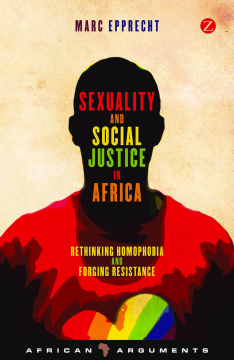
Additional Information
Book Details
Abstract
The persecution of people in Africa on the basis of their assumed or perceived homosexual orientation has received considerable coverage in the popular media in recent years. Gay-bashing by political and religious figures in Zimbabwe and Gambia; draconian new laws against lesbians and gays and their supporters in Malawi, Nigeria and Uganda; and the imprisonment and extortion of gay men in Senegal and Cameroon have all rightly sparked international condemnation. However, much of the analysis has been highly critical of African leadership and culture without considering local nuances, historical factors and external influences that are contributing to the problem. Such commentary also overlooks grounds for optimism in the struggle for sexual rights and justice in Africa, not just for sexual minorities but for the majority population as well.
Based on pioneering research on the history of homosexualities and engagement with current lgbti and HIV/AIDS activism, Marc Epprecht provides a sympathetic overview of the issues at play and a hopeful outlook on the potential of sexual rights for all.
'This book, based on pioneering research on the history of sexualities and engagement with current LGBTI activism, aims to provide a sympathetic overview of the issues at play. Clearly written and richly annotated, it will prove to be a useful guide for academics, social workers and activists.'
Africa at LSE
'Clearly written, well researched and deeply committed to global social justice, this book foregrounds decades of research on sexuality in Africa. It shows, despite much publicized homophobia, the existence of sexual tolerance and calls for the elaboration of erotic justice.'
Dr Robert Morrell, Research Office, University of Cape Town, South Africa
'Through meticulous scholarship, Marc Epprecht has become a global authority on how homosexuality is indigenous to Africa. In this book, he once more brings sanity, clarity and wisdom to a debate too often warped by ideology. His book is a vital introduction for anybody wishing to understand the complex ways that African societies are changing when it comes to issues of sexuality, and how new ideas about sexual identity - often deeply grounded in ancient traditions - are taking root on the continent. As the global culture wars play out on African soil, pitching those who advocate "human rights" against those who claim to represent "traditional values", Epprecht writes vividly of the people who actually live on the battlegrounds of these debates, and cautions us to eschew easy readings in favour of deeper understanding of the contexts. This very necessary book is a work of activism as well as scholarship. It provides trenchant lessons for all those interested in social justice and how to support and defend the rights of embattled sexual minorities in sub-Saharan Africa.'
Mark Gevisser, author, journalist and Open Society Fellow
'A very rich book'
Peter Geschiere, in Jounral of Modern African Studies
Marc Epprecht is a professor in the Department of Global Development Studies at Queen's University, Canada. He has consulted and published extensively on the history of gender and sexuality in Africa, including Hungochani: The History of a Dissident Sexuality in Southern Africa (winner of the 2006 Joel Gregory Prize from the Canadian Association of African Studies) and Heterosexual Africa? The History of an Idea from the Age of Exploration to the Age of AIDS (finalist for the 2009 Mel Herskovits prize from the African Studies Association). He recently received the Desmond Tutu Award for Outstanding Contributions to the Study of Sexuality in Africa from the International Resource Network-Africa. Marc holds his PhD in history from Dalhousie University, and has also taught at the University of Zimbabwe.
Table of Contents
| Section Title | Page | Action | Price |
|---|---|---|---|
| Cover | Front cover | ||
| About the author | iv | ||
| Title | v | ||
| Copyright | vi | ||
| Contents | vii | ||
| Acknowledgements | viii | ||
| 1 Introduction | 1 | ||
| 2 Demystifying sexuality studies in Africa | 36 | ||
| 3 Faiths | 66 | ||
| Traditional religions | 68 | ||
| ‘Arabs’ and Islam | 95 | ||
| 4 Sex and the state | 109 | ||
| Pre-colonial states | 109 | ||
| Colonialism | 118 | ||
| The post-colonial blues | 128 | ||
| 5 Struggles and strategies | 149 | ||
| Rights activism | 150 | ||
| Public health | 165 | ||
| 6 Conclusion | 176 | ||
| Notes | 181 | ||
| Chapter 1: Introduction | 181 | ||
| Chapter 2: Demystifying sexuality studies in Africa | 186 | ||
| Chapter 3: Faiths | 187 | ||
| Chapter 4: Sex and the state | 190 | ||
| Chapter 5: Struggles and strategies | 192 | ||
| Works cited | 195 | ||
| Index | 211 |
